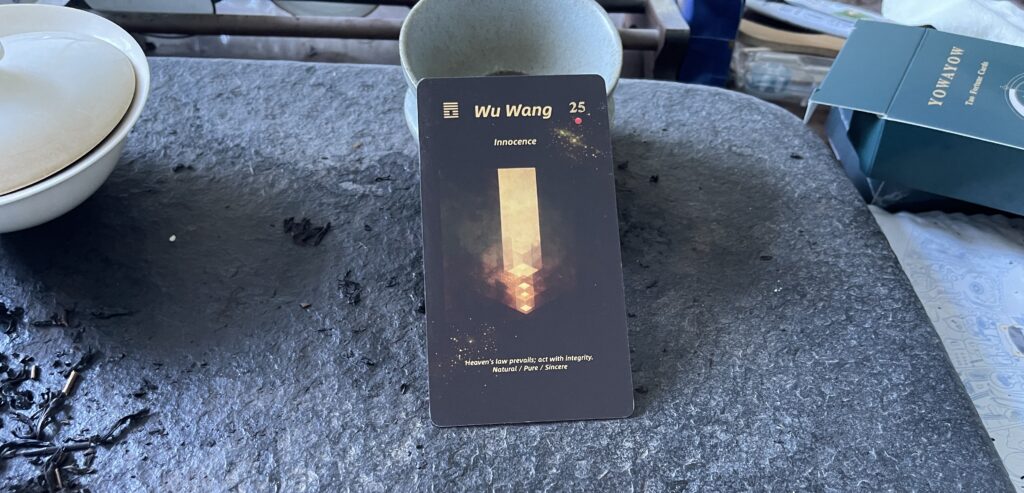
The Rise of Psychedelics Post-Pandemic: An I Ching Perspective
- By YOWAYOW
In recent years, a notable cultural phenomenon has emerged: a significant resurgence of public interest in psychedelics. Particularly in the wake of the global disruption caused by the COVID-19 pandemic, more people—from Silicon Valley innovators to individuals seeking better mental health solutions—are exploring these substances that long resided on the fringes. While multiple factors contribute to this trend, the ancient Chinese wisdom of the I Ching (Book of Changes) offers a fascinating philosophical lens, specifically through its 25th hexagram: Wu Wang (無妄).
Post-Pandemic Exploration: Seeking New Paths to Well-being
The COVID-19 pandemic undeniably left a deep psychological mark on global society. Prolonged isolation, health anxieties, economic uncertainty, and a widespread re-evaluation of life’s meaning created a unique backdrop. Many felt disconnected from their routines and began reassessing their values and lifestyles.
Against this backdrop, psychedelics re-entered the public discourse as potential tools for psychotherapy and personal growth. Scientific research, particularly exploring the potential of compounds like psilocybin, LSD, and MDMA in treating conditions such as depression, PTSD, and addiction, has provided a scientific foundation for this renewed interest. (See research from institutions like Johns Hopkins Center for Psychedelic & Consciousness Research). It seems people are searching for novel ways to process complex emotions, explore deeper layers of consciousness, and find a stronger sense of inner connection and purpose, addressing widespread post-pandemic mental health challenges (WHO reports on global mental health impact).
Introducing I Ching’s Hexagram 25: Wu Wang (The Unexpected / Innocence)
The I Ching, or Book of Changes, is a foundational text in Chinese philosophy, using 64 hexagrams—symbols composed of six lines—to describe the dynamic patterns of the universe and human life. Hexagram 25, Wu Wang (無妄), is formed by the trigram Qian (representing Heaven: creativity, strength, natural law) above, and Zhen (representing Thunder: action, movement, awakening) below.
The core meanings of Wu Wang can be understood as:
- Acting in Accord with Nature: Aligning actions with natural laws and principles, following the inherent way of things.
- Authenticity and Genuineness: Emphasizing inner sincerity, purity of motive, and freedom from falsehood or unrealistic expectations.
- The Unexpected: Wu Wang also implies unforeseen events. Acting correctly and naturally may bring unexpected good fortune. Conversely, acting inappropriately or with impure motives, even unintentionally, can lead to unexpected difficulties (sometimes called the “disaster of the unexpected”).
A Wu Wang Perspective on the Psychedelic Trend
Applying the philosophy of Wu Wang to the current interest in psychedelics offers some insightful perspectives:
- The Pandemic as Thunder (Zhen): The global health crisis acted like the trigram Zhen—a sudden thunderclap disrupting established norms and routines. It jolted people out of inertia, prompting reflection and a search for change, creating fertile ground for new awareness and behaviors.
- Seeking Guidance from Heaven (Qian): Facing chaos and uncertainty, many experienced an inner yearning for stability and a connection to something more fundamental—akin to the natural order, inner truth, and life force represented by Qian. The search for deeper meaning and psychological grounding reflects this longing.
- Psychedelics as an “Unexpected” Response? Turning towards psychedelics, outside of many mainstream mental health pathways, can be viewed as an “unexpected” (Wu Wang) choice, perhaps driven more by intuition or a deep-seated need. Many users report experiences of heightened authenticity, self-acceptance, and connection to others and nature during controlled psychedelic sessions. If this exploration stems from a genuine desire for self-understanding and healing (rather than mere escapism or novelty-seeking), it resonates with Wu Wang’s emphasis on shedding falsehoods (“Wang”) to embrace authenticity. Individuals may be using these tools hoping to peel back layers of conditioning and touch a more core sense of self.
- Alignment and Caution: Wu Wang also reminds us that acting “naturally” doesn’t mean acting carelessly. It stresses the importance of appropriateness and correctness. This suggests that approaching psychedelics requires significant caution and respect. Understanding potential risks, operating within safe and legal contexts (where applicable), emphasizing preparation, and prioritizing integration of the experience are crucial for acting “in accordance with the Dao.” Without the right set, setting, and intention, even potentially beneficial tools can be misused, leading to unforeseen negative consequences. (Resources on responsible use, e.g., MAPS Integration Resources)
Conclusion: Navigating Change with Authenticity
The growing interest in psychedelics in the post-pandemic era is a complex phenomenon touching on mental health, personal development, cultural shifts, and scientific discovery. Viewing it through the lens of the I Ching’s Wu Wang hexagram doesn’t provide simple answers but offers a framework for understanding some of the underlying impulses: a yearning for authenticity, a potential return to more ‘natural’ ways of healing (in the sense of aligning with inner truth), and humanity’s often unexpected paths toward meaning and healing amidst significant change.
Understanding this trend requires an open mind and careful consideration. Acknowledging the power and potential risks of these substances, while remaining attentive to their therapeutic possibilities under appropriate guidance, may help us better navigate the profound shifts occurring in our contemporary world.
Want to explore more cards?
See the full list of I Ching Hexagrams →
All predictions and interpretations on this site are purely for entertainment purposes and should not be taken seriously.
If you have a personal question or dilemma, you’re welcome to submit it.
We choose a few questions to respond to from time to time. Some of these may be featured on our blog, anonymously.
Please note:
Not every question will receive a response.
There is no cost to submit a question.
Responses are intended to inspire reflection, not provide absolute answers.
If selected, your question may be shared on the site, without any identifying information.
Submit your question via email: ask@yowayow.com
By submitting, you agree that your question may be used for public exploration on our site, anonymously and respectfully.